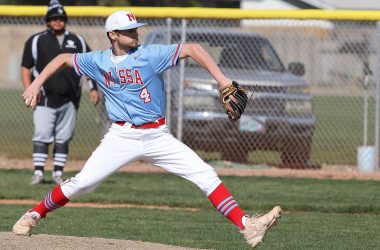VALE– Vale School District officials are pulling the high school’s yearbook and could be violating student journalists’ First Amendment rights after some found the words and phrases on the cover offensive.
In a Monday, Aug. 21, letter posted to the Vale School District Facebook page, Alisha McBride, Vale superintendent, wrote that it had been brought to her attention that the high school yearbook had words and phrases that “may elicit negative emotions for students, staff and the Vale community.”
The 2022-23 yearbook cover is a mosaic of more than 80 words. That includes ones flagged by McBride, such as “racism,” “inbred,” and “hillbilly,” are in small print on the back cover. The yearbook’s theme is dubbed “our small town feeling” and features terms describing rural life as “perfect,” “powerful” and “peaceful.”
In an interview, McBride said the word that for her was “nonnegotiable” is “inbred.”
In her Monday letter, McBride wrote that a “diverse” group of students and staff will decide on a revised cover “in an effort to avoid controversial material in the future.”
She declined to identify those students and staff or how they were chosen.
Instead, McBride said the “guidance” has been that the yearbook needs to be reviewed by the group. While McBride did not specifically comment on who is guiding how the review and revision of the yearbook will occur, she said the yearbook is sponsored by the district and “generous community donors.”
“As such,” she wrote, “it is important that the final product aligns with district policies.“
McBride wrote that she anticipates the revised publication to arrive in 12 weeks. Those who placed orders will receive new yearbooks when they arrive, she wrote. Meantime, the district is asking people to return copies of the current yearbook to the high school. About 200 had been ordered.
McBride said students create the yearbook as a class with support from an adviser, a school employee. She wouldn’t identify the adviser or the students who created the cover. Additionally, McBride turned down a request from the Enterprise to talk to the yearbook editor or other students involved in the publication.
McBride said the yearbook is wrapped up at the end of the school year and sent to the publisher over the summer. The school begins distributing copies in the fall.
The content, McBride said, does not align with the district’s policies surrounding freedom of expression. According to McBride, the district policy does not allow “school-sponsored media” to be defamatory.
Defamation is defined by Merriam-Webster as “the act of communicating false statements about a person that injure the reputation of that person.”
The district considers materials prepared, substantially written, published or broadcast by student journalists as “school-sponsored media.”
The district’s policy on high school journalists notes that school-sponsored media cannot be defamatory, obscene, factually inaccurate, or invade privacy, and it can’t create a material or substantial disruption of the orderly operation of a school.
School officials must base their reasoning for banning content on “specific facts, including past experience in the school and current events influencing student behavior, and not on undifferentiated fear or apprehension.”
While McBride contends the yearbook is not in step with the district’s policies on freedom of expression, the policy notes that high school journalists “generally” have the right to exercise freedom of speech and the press in “school-sponsored media.”
Oregon is one of almost 20 states that protects student journalists’ First Amendment rights.
Kristin Taylor, the head of the scholastic press rights committee of the Journalism Educators Association, said during a Thursday, Aug. 24, interview that student journalists have the same First Amendment protections as regular journalists.
“Just because they’re students doesn’t mean they’re not journalists,” she said.
Mike Hiestand, senior legal counsel for the Student Press Law Center, a national organization that protects the First Amendment rights of student journalists on high school and college campuses, said when Oregon lawmakers drafted the 2007 legislation, they particularly did not want school administrators making final content decisions on student-run publications.
“Oregon lawmakers specifically said, ‘that’s not the system we want here,'” Hiestand said.
The Oregon statute holds that “student journalists have the right to exercise freedom of speech and of the press in school-sponsored media, whether or not the media are supported financially by the school or by use of school facilities or are produced in conjunction with a high school class.”
Taylor said while it was hard to know what the students meant by putting the word “inbred” on the cover, it seemed to her that the students might have been trying to capture what they had heard about their community. She noted the cover had many positive sentiments about Vale, which also included phrases like “tough,” “simple” and “happy.”
She said that a word like “racism” could be something they believe occurs in the community.
“These are students commenting on real things they are experiencing in their community,” she said, “which is the whole heart of the First Amendment and the whole heart of student media is their ability to express what is truth.”
Taylor, the newspaper and yearbook adviser at a high school in southern California, said typically, students will include a written theme that explains or expands on the cover art of a yearbook.
The Enterprise was unable to review a complete copy of the yearbook. However, McBride shared copies of the front and back cover.
Heistand said there are two forms of censorship: prior review and prior restraint. He said prior review allows school administrators to review content before it is published, a more subtle form of censorship. In Oregon, he said, a prior review is not illegal. However, he said a prior review is limited and a school could only take action if the content was unprotected under the First Amendment.
Prior restraint, he said, occurs when a school official tells a student publication not to print a story, photo, or piece of media and takes action that prevents publication.
Heistand said issues of censorship are not unique to Vale. In 2021, officials at an Arkansas high school tore out pages from the school’s published yearbook that included references to the U.S. Capitol riot, George Floyd and the pandemic, claiming “community backlash.”
Heistand said the student law center asked for documentation of the parent backlash, and the school’s superintendent could not produce any.
He said there is another case in Florida where a high school provided coverage of LGBTQ events and some parents complained. There, school administrators recalled the yearbooks and offered refunds, Heistand said. He said district records showed only two refund requests.
He said instances of censorship of yearbooks have spiked nationwide over the last two years.
“Unfortunately,” he said, “this is not an isolated situation.”
Taylor said without knowing all of the facts in Vale, it might be the case that parents are offended being called inbred and want the yearbook pulled without thinking about what the students might have intended.
Taylor said Vale and other schools don’t do students any favors if they are prevented from reporting current events or aren’t able to report on the truth of situations as students in their communities.
Ultimately, she said, students will go to different venues, such as Tik-Tok, YouTube, and other Social Media sites, where there are no fact checking and ethical protocols that students learn while participating in a school-sponsored media outlet.
She said one thing she discusses with her students is just because the First Amendment might protect a piece of content, it does not mean they should publish it.
“Even if it is legal,” she said, “you should have those ethical conversations.”
Certain words can’t be banned out of existence, Taylor said.
She said students will find or use them somewhere else without the guidance of a skilled journalism educator who can talk to them about the meaning behind the words and ethics of publishing such words.
For her part, McBride said there has to be a middle ground between creativity and free expression. She said the cover ran afoul of the district’s policies in this situation.
Taylor said a journalism classroom is a place for a student to experience and live democracy. In the classroom and on campus, she said, they can experience what it means to be a journalist and make hard decisions to investigate the truth even when it makes those in authority uncomfortable.
“We don’t want our kids to write horrible slanderous hit pieces on anyone,” Taylor said. “But that’s not what this is.”

NEWS TIP? Send an email to [email protected].
SUPPORT OUR WORK – The Malheur Enterprise delivers quality local journalism – fair and accurate. You can read it any hour, any day with a digital subscription. Read it on your phone, your Tablet, your home computer. Click subscribe – $7.50 a month.




